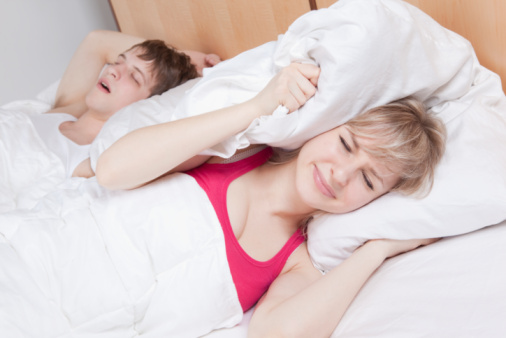Snoring is a harmless annoyance that affects roughly 59% of American adults. While snoring provides no cause for serious concerns, it can be a sign of sleep apnea or other sleep disorders, though this may not always be the case. Most people who deal with snoring problems will not even recognize that they snore during sleep, unless told so by another individual.
Alternative Names
There are no common alternative names for snoring.
Symptoms
Snoring is any kind of noise related to breathing during sleep. Snoring noises are different for all people and can be loud, soft, raspy, deep, or even high-pitched. Snoring will not cause a person to stop sleeping, as this is a more serious ailment called sleep apnea.

Causes
In general, the causes of snoring are unknown to the medical world. Over the past 100 years, scientists have attempted to crack the snoring mystery with little success.
There are a few characteristics of people who are more prone to have snoring problems, however, and these are possibly related causes to snoring that scientists are looking into.
Snoring? Get Remedies Fast!
Some of these potential causes for snoring include:
- Nasal congestion that is the result of a cold or allergies. If congestion lasts a particularly long time, snoring is more likely to follow.
- Obesity. Being overweight can often lead to other problems that can affect the neck and air passageways. These problems often put extra pressure on a person’s airways and can lead to heavy snoring.
- Tonsillitis or another tonsil-related problem. When tonsils become extremely swollen, they tend to block the patients airways which leads to snoring.
- A relationship has recently been made between the use of sleeping pills and alcohol prior to falling asleep and snoring.
- Genes and heredity. It has been shown that narrow throats and enlarged tonsils can be hereditary. This means that if your parents and grandparents had snoring problems, you may have a greater chance of experiencing them also.
- Gender. Men tend to have a much more narrow airway than women. This physical characteristic causes men to snore more often than women.
Risk Factors
Snoring poses no serious health risks to most individuals. If snoring becomes excessive and prevents the individual or his or her sleeping partner from receiving adequate sleep, snoring can become more of an issue. The most common risks associated with excessive snoring are drowsiness, sleep apnea, shoulder and neck pains, and difficulty breathing during sleep.
Prevention Tips
Many cultures have had the challenge of dealing with snoring. For this reason there are many different tips on how someone can prevent snoring from disturbing their sleep. Though none of these tips is proven to cure snoring, many of them are used successfully by snorers.
- Avoid alcoholic drinks at bedtime and sleeping pills if at all possible. Many of these substances tend to relax the entire body, including the airway. When airways become relaxed there is a greater chance that tissues within the airway will rub together and cause snoring.
- Lose weight if you are obese. Obesity is one of the most common causes of snoring due to the pressure that is placed on the body’s airways. By losing weight, the person is able to reduce the pressure on airways and allow themselves to breathe easier throughout the night.
- Avoid tobacco. Smoking and other uses of tobacco have been shown to cause severe respiratory problems. These problems can range from nasal and lung congestion, to cancer and other deadly illnesses.
- Sleep on your side and stomach. Individuals who sleep on their back are more susceptible to snoring. Sleeping on your back relaxes the airways and has can cause the tissues in the airways to rub together, similar to using sleeping pills to relax your body.
- Avoid dairy products before going to bed. Dairy products such as ice cream, milk, yogurt, and cheese create excess mucus in the mouth and throat. This excess mucus acts as a blockade to air that is attempting to pass through the throat.
- Create regular sleep patterns. This is perhaps the best way to prevent snoring from entering your bedroom. As you create a regular, healthy sleeping schedule, your body will be able to get better sleep. It has been shown that snoring is often the result of poor sleeping.
Tests and Diagnosis Considerations
Diagnosing a snorer is very simple. It is easiest to diagnose a snorer when he or she has a sleeping partner because this person can verify whether or not there is a snoring problem. If you do not have a sleeping partner, you may be able to notice snoring problems by recognizing drowsiness throughout the day, excessive drooling during sleep, and waking up several times during the night for unknown reasons (i.e. not having to go to the bathroom, get a drink).
If you snore, there are some ways in which you can determine the cause of your snoring, though it may require a partner’s help. If you snore with your mouth closed, then there is most likely a problem with the tongue such as it falling back over the airway. Snoring with your mouth open is the result that the tissues in your throat are rubbing together and blocking air from passing through. If snoring only occurs while sleeping on your back, then the snoring probably is not severe and only requires improving your sleep habits and getting more regular sleep. If, however, snoring occurs in any sleep position then the snoring may be more intense and require a consultation with a physician.
Treatment Options for Snoring
Herbal and Home Remedies
 There are many herbal solutions to snoring. One of the most common herbs is household ginger.
There are many herbal solutions to snoring. One of the most common herbs is household ginger.
Ginger has historically been known to help in creating a greater secretion of saliva.
An increase in saliva will coat the throat and airways and provide a much smoother passage of air from the lungs through to throat.
Honey has been shown to have this same effect.
Using Dioscorea
Another herbal remedy that has been shown to protect against snoring is called Dioscorea villosa, or wild yam.
Dioscorea villosa is a natural cure for inflammation. Vitamin C is similar to the wild yam in that it helps to sooth the throat, cures inflammation, and aids in fighting against snoring. Marjoram oil is commonly believed to be a cure for snorers. The oils is sold in jars and is soaked in a type of sponge.
Snorers are instructed to open the jar and leave it by their beds, which allows the oils and scents of the marjoram oil to fill the room and enter the airways. There are other types of aromatherapy techniques to preventing snoring. The main purpose of these aromatherapeutic oils is to excite the airways and allow them to work properly without the rubbing together of tissues.
Breathing Strips
More recently, companies have released breathing or nasal strips that are believed to prevent snoring. The strips look like small band-aids and have a small flexible piece on its back that holds the nostrils open. The science behind holding the nostrils open is that this should provide a relief from congestion. Nasal strips work for some people, but not for all snorers.
Physical Conditions
Most snoring is the result of problems in the back of the throat and not entirely due to congestion of the nose.
Physicians suggest sleeping on a firm mattress to prevent snoring. A firm, durable mattress is considered to be the best way to support the neck and stop any obstructions from forming in the airway. Also, it is recommended that elevating your head above the rest of your body will prevent obstructions. This can be done by using multiple pillows or placing wood or bricks beneath the frame of the mattress on the side that supports your head.
Exercising
One of the most important activities that can be done without medical aid to prevent snoring is to receive regular exercise. It has been shown that healthy and fit people snore less than unhealthy, out-of-shape sleepers. Exercise improves cardiovascular health as well as respiratory and breathing health.
Another natural remedy for snoring is performing throat exercises before sleep. Throat exercise can refer to any activity that causes rigorous motion of the throat and airway, such as talking, singing, and deep breathing.
Pharmaceutical Remedies
Most physicians do not recommend any prescription drugs for snoring. If the snoring becomes excessive and shown to be a result of sleep apnea, doctors may recommend recommend the use of a CPAP mask, which stands for “Continuous Positive Airway Pressure”. The mask works similar to nasal strips but keeps the windpipe open during sleep and prevents any obstructive actions of the throat and other respiratory problems. The CPAP fits over the nose and delivers a low pressure stream of air to the mask and into the airway. There is another machine called a Bilevel Positive Airway Pressure, BiPAP. Both of these machines are used only in severe snoring cases and can have side effects. These side effects include:
- Nosebleeds
- Irritation of the eye
- Respiratory problems and infections
- Intense nasal congestion
- Dry tongue and mouth
- Claustrophobia
Surgical Treatments
There are several operations that can be performed to prevent snoring. While these operations are considered to be very effective, patients must consider the risks of being operated on prior to opting for surgery. The most common surgery for snoring is called LAUP, Laser Assisted Uvulopalatoplasty. This operation is often recommended to cure sleep apnea. During and LAUP operation, the surgeon is assisted by a laser that is able to cut away the tissue that hangs from the back of the mouth called the uvula. As the uvula is cut away, there becomes less of a chance for it to become inflamed and prevent air passage. LAUP operations often require that the patient be operated on more than once.
Another surgical procedure for snoring that is somewhat new is called Radio Frequency Tissue Ablation, RFTA. This type of operation can typically be done in a doctor’s office and is also called Somnoplasty. The purpose of an RFTA operation is to shrink the uvula. Rather than using a laser to cut away at the uvula, RFTA uses high energy radio waves to shrink the uvula and prevent irritation.
Nasal Surgery
Nasal surgery can often be performed to rid the airways of obstructions in the nose. This is a surgery that is recommended to people who have trouble breathing during the day, as well as at night.
Repose is the name given to another surgical method designed to treat snoring and other forms of sleep apnea. Repose is intended to prevent the tongue from blocking the airway during periods of sleep. This is done by inserting a small screw into the back of the lower jaw bone. The surgery is relatively new and studies are still being done on potential risks and irreversible affects.
As with any operation, surgeries that are designed to cure snoring problems have many associated risks. Patients should seriously consider the risks and benefits of any operation before making a decision.

3 Comments
I have tonsillitis and at night my snoring makes me wake up in tears
The doc. Say finish my meds and ill bee all right..but my issue is generally when I snore a lot it LEADS to a sore or strep or tonsillitis throat. I need to know how to stop snoring forever…lol plz help
Amazing post!! My husband have been suffering from snoring..Thank you so much for posting this article..It was very helpful to me..
Great article! I have had the most success with using the anti-snoring chin strap device for my wife. I think the key is to try different solutions since everyone will respond differently depending on their own body and sleep disorder.